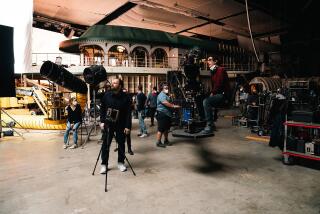He left deadline pressures behind, but his wife had to spend $47 in florins with time running out
- Share via
I liked Belgrade. It is like a smaller Paris, but much less frantic. It has had the misfortune to lie on a crossroads of Europe, and has been destroyed 40 times. And today the U.S. Embassy has enormous concrete flower pots in front of it as bulwarks against a terrorist attack by suicide truck.
But Belgrade has made it into the 20th Century. I saw a Coca-Cola ad on a streetcar, and our tour bus guide, a local, told us, “Next year we will have a McDonald’s.” I wasn’t sure whether she spoke with pride or irony.
In the evening we walked in a park that had once been a fort. In a courtyard guarded by ancient walls, youths were playing a serious game of basketball, in front of a bleachers, with a woman referee.
Next to the tennis court an open-air disco’s loudspeaker was setting up a dreadful din. It was going to be a big Saturday night. One thing struck me about Belgrade. The Yugoslavian girls, walking in the park or standing on street corners waiting for buses, seemed extraordinarily pretty.
We dined in a traditional Yugoslavian restaurant, serenaded by musicians playing flutes, violins, accordions and tambourines. David McConaughy, our luncheon-companion on the boat, a retired USC business school professor and an amateur musician, bought the flutist’s flute for $4. (He had another; probably dozens.)
David’s wife, Eunice, wasn’t especially amused by this impulsive act.
“If they come round selling those tambourines,” he told her, “buy one--we can go on the road.”
Life settled into an easy routine on the MS Sofia as it powered up the Danube: 8 a.m., wake-up call with soft music; 8:30, breakfast in the restaurant; 10, aerobics with Nina on sun deck; 10:30, bar opens on sun deck; 12:30, luncheon in the restaurant, 3 p.m., cake and tea.
In the morning we sat in the sun and watched the Balkan forests, landscapes and villages go by. Occasionally we passed a barge, but little happened to disturb the tranquillity.
One afternoon, to break the monotony, we had a schnapps tasting in the small bar, an event that included folk dancing by the crew, in costume, and the tasting of four kinds of schnapps, which is potent stuff.
Another afternoon we had a wine-tasting contest, tasting two white Bulgarian wines and two red; again, the crew danced for us, which made me wonder who was watching the bridge. Dinner, as usual, was at 8:30.
As soon as dinner ended, the Promenade Bar was open. This was a large playroom that occupied the bow of the ship, just below the bridge. A combo including sax, piano, guitar and drums played jazz and American pop songs until the small hours. Naturally we lounged and listened, since there was nothing we really had to do.
As a diversion, we sometimes went into the smaller bar to hear Siggy at the piano. Siggy played the inevitable “Doctor Zhivago” song and other popular favorites, but it turned out that his secret passion was Chopin, and we easily goaded him into a medley of etudes, preludes and nocturnes.
Two or three times during the voyage upstream, the ship had to go through locks--usually at midnight or so--and the more adventurous passengers either stayed up or set their alarms to witness this ingenious procedure. One night we passed within three feet of a lock on which stood three Romanian soldiers with their rifles slung over their shoulders. In the reality of today’s martial alignments, they looked pitifully like toy soldiers.
My most vivid memory of Budapest, one of Europe’s oldest and most beautiful cities, is of drinking a beer on the terrace of the new Hilton Hotel overlooking the river and Pest, and of converting a $50 traveler’s check into florins.
Our mission then became to spend $50 worth of florins before our ship sailed. We left the bus at the famous walking street, but it was under serious repair, and the chatter of jackhammers and the dust somewhat clouded our sense of romance.
We drifted into a kind of cafeteria-style place where the system turned out to be that you pointed to what you wanted, a girl made a note of your order on a piece of paper, which was then picked up by a waitress who delivered the order to your table, if you could find one. I got a sandwich somewhat like the one I had ordered, but my wife’s dish was unrecognizable. She was also frustrated in her desire for a cup of chocolate. She didn’t know the Hungarian word for chocolate; but evidently it wasn’t chocolate . I was glad I had ordered a beer.
In florins, though, the entire bill came to less than $3. That left us with $47 to go and time running out. We walked back toward the ship, which was docked nearby, and just as we were about to reach the gangway my wife spotted a souvenir shop across the street.
She took the florins and ran for the shop while I boarded the ship. I was growing nervous when she finally came aboard. She made what we used to call, when I was in the merchant marine, a pier-head jump.
“I lucked out,” she said, emptying a great plastic sack full of pink and green clothing that looked as if it had come off a group of folk dancers.
She tried it on. “How do I look?” she asked.
She looked like about what you would expect for $47 in florins.
More to Read
Sign up for Essential California
The most important California stories and recommendations in your inbox every morning.
You may occasionally receive promotional content from the Los Angeles Times.













